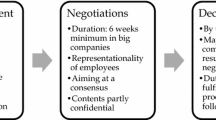Abstract
This article advances an interpretation of Jacques Lacan’s discourse of the capitalist, focused on its implications for the styles of mastery characteristic of contemporary capitalism. The capitalist discourse is found to offer a remarkably apt formalisation of new modes of interpellation that emerged from capitalism’s crises of legitimacy in the 1960s and 1970s. Through close readings of a scene from the anti-capitalist documentary The Corporation and advertisements of McDonald’s and Shell, the capitalist discourse is deployed to account for contemporary capitalism’s public self-presentation and projections of its ideal Other-collaborator, as well as novel, project-based organisational models. The article further contributes to Lacanian scholarship on latest trends in corporate employee management by articulating a strategy that employs self-critique as a way to muster and harvest employees’ idealistic energies for corporations’ self-interest and public legitimacy.

Similar content being viewed by others
References
Achbar, M. and Abbott, J. (dir.) (2003) The Corporation. Big Picture Media Corporation.
Arnaud, G. and Vanheule, S. (2007) The division of the subject and the organization: A Lacanian approach to subjectivity at work. Journal of Organizational Change Management 20(3): 359–369.
Beucké, P. (2009) Quelques conséquences du discours capitaliste. http://www.cerclefreudien.org/wp-content/uploads/2012/11/62.pdf, accessed 17 April 2018.
Boie, G. and Pauwels M. (BAVO) (2010) Too Active to Act. Cultureel Activisme Na het Einde van de Geschiedenis. Amsterdam: Valiz Publishers.
Boie, G. and Pauwels M. (BAVO) (2007) Always choose the worst option. Artistic resistance and the strategy of over-identification. In: Boie, G. and Pauwels M. (BAVO) (eds.) Cultural Activism Today. The Art of Over-Identification. Rotterdam: Episode Publishers, pp. 18–39.
Boie, G. and Pauwels M. (BAVO) (2008) The freedom not to have a Wal-Mart. Contemporary anti-capitalist documentary and its enlightened critics. In: Hofmeyr, A. (ed.) The Wal-Mart Phenomenon. Resisting Neo-Liberal Power Through Art, Design and Theory. Maastricht: Jan van Eyck Publishers, pp. 31–54.
Boltanski, L. and Chiapello, E. (1999) Le Nouvel Esprit du Capitalisme. Paris: Gallimard.
Bruno, P. (2010) Lacan Passeur de Marx: L’Invention du Symptôme. Paris: Érès.
Bryant, L.R. (2008) Žižek’s new universe of discourse: Politics and the discourse of the capitalist. International Journal of Žižek Studies 2(4): 1–48.
Cederström, C. and Grassman, R. (2008) The masochistic reflexive turn. Ephemera 8(1): 41–57.
Cederström, C. and Hoedemaekers, C. (eds.) (2010) Lacan and Organization. London: Mayfly Books.
de Castro, J.C.L. (2016) The discourse of hysteria as the logic of mass consumption. Psychoanalysis, Culture & Society 21(4): 403–421.
Declercq, F. (2006) Lacan on the capitalist discourse: Its consequences for libidinal enjoyment and social bonds. Psychoanalysis, Culture & Society 11(1): 74–83.
Dolar, M. (1993) Beyond interpellation. Qui Parle 6(2): 75–96.
Feldner, H. and Vighi, F. (2015) Critical Theory and the Crisis of Contemporary Capitalism. New York: Bloomsbury.
Fleming, P. and A. Sturdy (2009) “Just be yourself!”: Towards neo‐normative control in organisations? Employee Relations 31(6): 569–583.
Lacan, J. (1970) Radiophonie. Scilicet 2(3): 55–99.
Lacan, J. (1972) Du discours psychoanalytique. In: B. Contri (ed.) (1978) Lacan in Italia. 1953–1978. En Italie Lacan. Milan: La Salamandra, pp. 27–39.
Lacan, J. (2007a) The Other Side of Psychoanalysis: The Seminar of Jacques Lacan, Book XVII. Translated by R. Grigg. New York and London: W.W. Norton.
Lacan, J. (2007b) Le séminaire livre XVIII. D’un discours qui ne serait pas du semblant. Paris: Éditions du Seuil.
Madra, Y.M. and Özselçuk, C. (2015) The direction of the movement does matter: A response to Fabio Vighi. Psychoanalysis, Culture & Society 20(1): 20–28.
McGowan, T. (2004) The End of Dissatisfaction? Jacques Lacan and the Emerging Society of Enjoyment. Albany: State University of New York Press.
Olivier, B. (2009) Lacan on the discourse of capitalism; critical prospects. Phronimon 10(1): 25–42.
Pavón-Cuéllar, D. (2009) Marxisme Lacanien. Paris: Psychophores.
Pauwels, M. (2008) Lacan and the subversion of the discourse of the capitalist. Paper presented at the annual conference of the Philosophical Society of South Africa, 17 January, Pretoria, South Africa.
Sauret, M.-J. (2015) Psychopathology and fractures of the social bond. Journal of the Circle for Lacanian Ideology Critique 8: 39–63.
Tomšič, S. (2015) The Capitalist Unconscious. Marx and Lacan. London: Verso.
Vanheule, S. (2016) Capitalist discourse, subjectivity and Lacanian psychoanalysis. Frontiers in Psychology 7: 19–48.
Vighi, F. (2015) Ontology of crisis and Lacan’s discourse of the capitalist. Psychoanalysis, Culture & Society 20(1): 1–19.
Žižek, S. (1989) The Sublime Object of Ideology. London and New York: Verso.
Žižek, S. (1998) Four discourses, four subjects. In: S. Žižek (ed.) Cogito and the Unconscious. London: Duke University Press, pp. 74–113.
Zupančič, A. (2006) When surplus enjoyment meets surplus value. In: J. Clemens and R. Grigg (eds.) Jacques Lacan and the Other Side of Psychoanalysis. Durham and London: Duke University Press, pp. 155–178.
Author information
Authors and Affiliations
Corresponding author
Additional information
Publisher's Note
Springer Nature remains neutral with regard to jurisdictional claims in published maps and institutional affiliations.
Rights and permissions
About this article
Cite this article
Pauwels, M. The most hysterical of masters: Lacan’s capitalist discourse and contemporary styles of interpellation. Psychoanal Cult Soc 24, 53–71 (2019). https://doi.org/10.1057/s41282-019-00117-9
Published:
Issue Date:
DOI: https://doi.org/10.1057/s41282-019-00117-9




